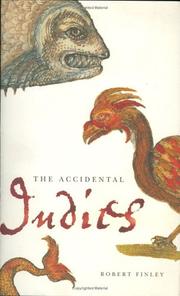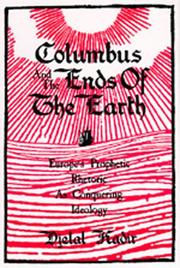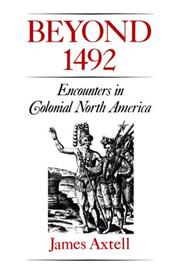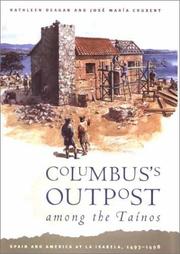| Listing 1 - 10 of 13 | << page >> |
Sort by
|
Book
ISBN: 1538482304 4057664593344 9700000042059 Year: 2019 Publisher: [Place of publication not identified] : Good Press,
Abstract | Keywords | Export | Availability | Bookmark
 Loading...
Loading...Choose an application
- Reference Manager
- EndNote
- RefWorks (Direct export to RefWorks)
"Christopher Columbus" by Justin Winsor is a biography of Christopher Columbus and how he made such a big invention. He was an Italian explorer and navigator. Largely self-educated, Columbus was widely read in geography, astronomy, and history. He developed a plan to seek a western sea passage to the East Indies, hoping to profit from the lucrative spice trade. Columbus's expeditions inaugurated a period of exploration, conquest, and colonization that lasted for centuries, helping create the modern Western world. Many places in the Western Hemisphere bear his name, including the country of Colombia, the District of Columbia, and British Columbia.
Columbus, Christopher. --- Colombo, Cristoforo --- Colomb, Christophe --- Columbus, Christoffel --- Colombus, Christophorus --- Columbus, Christopher --- Colón, Cristóbal --- Kolumbus, Christoph
Book
ISBN: 0819573892 9780819573896 0819552410 9780819552419 0819562491 9780819562494 Year: 1991 Publisher: [Middletown, Conn.] Hanover, NH Wesleyan University Press University Press of New England
Abstract | Keywords | Export | Availability | Bookmark
 Loading...
Loading...Choose an application
- Reference Manager
- EndNote
- RefWorks (Direct export to RefWorks)
A novel which turns cultural aggression on its head as the Native American heirs of Christopher Columbus, himself descended from early Mayan explorers, create a fantastic tribal nation.
Indians of North America --- Fiction. --- Columbus, Christopher --- Colombo, Cristoforo --- Colomb, Christophe --- Columbus, Christoffel --- Colombus, Christophorus --- Colón, Cristóbal --- Kolumbus, Christoph

ISBN: 1282858386 9786612858383 0773568174 9780773568174 9781282858381 6612858389 0773520066 9780773520066 0773535519 Year: 2000 Publisher: Montreal [Que.] McGill-Queen's University Press
Abstract | Keywords | Export | Availability | Bookmark
 Loading...
Loading...Choose an application
- Reference Manager
- EndNote
- RefWorks (Direct export to RefWorks)
At once moving and lyrical, The Accidental Indies is a tale in which we join Christopher Columbus on a fantastical voyage through western seas and Western imagination. Robert Finley imagines, sings, charts, and paints the story of Columbus's problematic 1492 expedition to the Caribbean, creating a world that is as vivid and compelling as the explorer's own voyage to the misnamed "Indies".It is a journey through wondrous words that begins with Columbus's earliest explorations when he first "tests the heft and roundness of this earth against his infant head" by stepping from the edge of his rocking cradle to come up short on the boards of the nursery floor. Finley charts a course for us through the days at sea, through the voyage itself, its records and commentaries, into the fraught territory of Columbus' imaginary "Indies" and the representation of this New World on his return to Spain.This incisive and luminescent story, scrupulously grounded in sixteenth-century sources, illuminates the power that "naming" has to create a world - in this case a world still haunted by being the accidental Indies. It is a book about how we perceive and represent the world around us, about the creative and destructive power of language. Through its elaboration of the rich and lively ironies of the Columbus story, The Accidental Indies looks at the nature of storytelling itself.
Discoveries in geography --- Explorers --- Columbus, Christopher, --- West Indies --- Columbus, Christopher --- Colomb, Christophe, --- Colombo, Cristoforo --- Colomb, Christophe --- Columbus, Christoffel --- Colombus, Christophorus --- Colón, Cristóbal --- Kolumbus, Christoph
Book
ISBN: 9031708798 Year: 1991 Volume: vol *233 Publisher: Averbode Altiora
Abstract | Keywords | Export | Availability | Bookmark
 Loading...
Loading...Choose an application
- Reference Manager
- EndNote
- RefWorks (Direct export to RefWorks)
3 augustus 1492. Drie karvelen verlaten Spanje en varen naar het westen, onder leiding van Christoffel Colombus. Op 12 oktober zet hij voet aan wal op het eiland San Salvador. Enkele maanden na zijn tergkeer in Europa drukt Dirk Martens in Aalst al het reisverslag van Colombus...
Dutch literature --- Columbus, Christoffel --- Ontdekkingsreizen --- 16e eeuw --- Martens, Dirk --- Boekdrukkunst --- Jeugdboeken 10-12 jaar --- Historische verhalen --- jeugdliteratuur --- avonturenverhaal --- ontdekkingsreizen --- Jeugdliteratuur ; verhalend --- Jeugdliteratuur --- Ontdekkingsreis --- Colombo, Cristoforo --- Colomb, Christophe --- Colombus, Christophorus --- Columbus, Christopher --- Colón, Cristóbal --- Kolumbus, Christoph
Book
ISBN: 848522955X Year: 1984 Publisher: Madrid Historia 16
Abstract | Keywords | Export | Availability | Bookmark
 Loading...
Loading...Choose an application
- Reference Manager
- EndNote
- RefWorks (Direct export to RefWorks)
Spanish literature --- Columbus, Christopher --- Spanish-American literature --- Explorers --- Indians of the West Indies --- Indigenous peoples --- Biography --- History --- Colombo, Cristoforo --- Colomb, Christophe --- Columbus, Christoffel --- Colombus, Christophorus --- Colón, Cristóbal --- Kolumbus, Christoph --- America --- Discovery and exploration --- Spanish. --- Early accounts to 1600.
Book
ISBN: 0826519555 0826519539 1306891469 0826503489 0826519547 Year: 2014 Publisher: Nashville : Vanderbilt University Press,
Abstract | Keywords | Export | Availability | Bookmark
 Loading...
Loading...Choose an application
- Reference Manager
- EndNote
- RefWorks (Direct export to RefWorks)
"Explains the popularity of Christopher Columbus in the early Americas. Illustrates how New World representations of Columbus integrate older discourses of empire. Shows how the idea of empire was significant in the construction of the new nations of the Americas"--
History / United States --- Literary Criticism / Caribbean & Latin American --- History / Caribbean & West Indies --- History --- Columbus, Christopher --- Influence. --- America --- Discovery and exploration --- Spanish. --- Civilization --- European influences. --- Colombo, Cristoforo --- Colomb, Christophe --- Columbus, Christoffel --- Colombus, Christophorus --- Colón, Cristóbal --- Kolumbus, Christoph --- Europe

ISBN: 0520911334 0585117101 9780520911338 9780585117102 0520074424 9780520074422 Year: 1992 Publisher: Berkeley [etc.] University of California Press
Abstract | Keywords | Export | Availability | Bookmark
 Loading...
Loading...Choose an application
- Reference Manager
- EndNote
- RefWorks (Direct export to RefWorks)
Columbus is the first blazing star in a constellation of European adventurers whose right to claim and conquer each land mass they encountered was absolutely unquestioned by their countrymen. How a system of religious beliefs made the taking of the New World possible and laudable is the focus of Kadir's timely review of the founding doctrines of empire. The language of prophecy and divine predestination fills the pronouncements of those who ventured across the Atlantic. The effects of such language and their implications for current theoretical debates about colonialism and decolonization are legion. Kadir suggests that in this supposedly postcolonial era, richer nations and the privileged still manipulate the rhetoric of conquest to justify and serve their own worldly ends. For colonized peoples who live today at the "ends of the earth," the age of exploitation may be no different from the age of exploration.
Prophecy --- Americas - General --- Regions & Countries - Americas --- History & Archaeology --- Christianity. --- Christianity --- Columbus, Christopher. --- America --- Europe --- Discovery and exploration. --- Territorial expansion. --- Prophecy (Christianity) --- Colomb, Christophe --- Colombus, Christophorus --- Columbus, Christoffel --- Columbus, Christopher --- Colón, Cristóbal --- Kolumbus, Christoph --- Council of Europe countries --- Eastern Hemisphere --- Eurasia --- Colombo, Cristoforo --- Discovery and exploration --- Territorial expansion

ISBN: 0190281979 1280526645 0195359828 1429400129 9780195359824 9780195359824 9780195080339 0195080335 9780195068382 0195068386 9781280526640 9786610526642 6610526648 0195080335 0195068386 0197711731 Year: 1992 Publisher: New York Oxford Oxford University Press
Abstract | Keywords | Export | Availability | Bookmark
 Loading...
Loading...Choose an application
- Reference Manager
- EndNote
- RefWorks (Direct export to RefWorks)
In this provocative and timely collection of essays--five published for the first time--one of the most important ethnohistorians writing today, James Axtell, explores the key role of imagination both in our perception of strangers and in the writing of history. Coinciding with the 500thanniversary of Columbus's ""discovery"" of America, this collection covers a wide range of topics dealing with American history. Three essays view the invasion of North America from the perspective of the Indians, whose land it was. The very first meetings, he finds, were nearly always peaceful.Other essays
Indians of North America --- History --- Columbus, Christopher --- Colombo, Cristoforo --- Colomb, Christophe --- Columbus, Christoffel --- Colombus, Christophorus --- Colón, Cristóbal --- Kolumbus, Christoph --- Influence. --- North America --- Discovery and exploration. --- America --- Discovery and exploration --- Spanish. --- Turtle Island (Continent) --- Colonial period, ca. 1600-1775 --- Influence --- Spanish --- 16th century

ISBN: 128172260X 9786611722609 0300133898 9780300133899 9781281722607 9780300090406 0300090404 Year: 2002 Publisher: New Haven, Conn. : Yale University Press,
Abstract | Keywords | Export | Availability | Bookmark
 Loading...
Loading...Choose an application
- Reference Manager
- EndNote
- RefWorks (Direct export to RefWorks)
In 1493 Christopher Columbus led a fleet of seventeen ships and more than twelve hundred men to found a royal trading colony in America. Columbus had high hopes for his settlement, which he named La Isabela after the queen of Spain, but just five years later it was in ruins. It remains important, however, as the first site of European settlement in America and the first place of sustained interaction between Europeans and the indigenous Taínos.Kathleen Deagan and José María Cruxent now tell the story of this historic enterprise. Drawing on their ten-year archaeological investigation of the site of La Isabela, along with research into Columbus-era documents, they contrast Spanish expectations of America with the actual events and living conditions at America's first European town. Deagan and Cruxent argue that La Isabela failed not because Columbus was a poor planner but because his vision of America was grounded in European experience and could not be sustained in the face of the realities of American life. Explaining that the original Spanish economic and social frameworks for colonization had to be altered in America in response to the American landscape and the non-elite Spanish and Taíno people who occupied it, they shed light on larger questions of American colonialism and the development of Euro-American cultural identity.
Indians --- First contact of aboriginal peoples with Westerners --- First contact with Europeans. --- Columbus, Christopher --- Colombo, Cristoforo --- Colomb, Christophe --- Columbus, Christoffel --- Colombus, Christophorus --- Colón, Cristóbal --- Kolumbus, Christoph --- Homes and haunts --- La Isabela (Dominican Republic) --- Isabela, La (Dominican Republic) --- Isabella (Dominican Republic) --- Colonization. --- First contact (Anthropology) --- First contact with Europeans --- First contact with other peoples.
Book
ISBN: 1442668245 1442647469 1442668253 Year: 2014 Publisher: Toronto, [Ontario] ; Buffalo, [New York] ; London, [England] : University of Toronto Press,
Abstract | Keywords | Export | Availability | Bookmark
 Loading...
Loading...Choose an application
- Reference Manager
- EndNote
- RefWorks (Direct export to RefWorks)
In this fascinating book, Evelina Gužauskytė uses the names Columbus gave to places in the Caribbean Basin as a way to examine the complex encounter between Europeans and the native inhabitants.
Names, Geographical --- Geographic names --- Geographical names --- Place names --- Placenames --- Toponyms --- Names --- Geography --- Toponymy --- Columbus, Christopher --- Colombo, Cristoforo --- Colomb, Christophe --- Columbus, Christoffel --- Colombus, Christophorus --- Colón, Cristóbal --- Kolumbus, Christoph --- Caribbean Area --- South America --- Caribbean Free Trade Association countries --- Caribbean Region --- Caribbean Sea Region --- West Indies Region --- Discovery and exploration --- Spanish.
| Listing 1 - 10 of 13 | << page >> |
Sort by
|

 Search
Search Feedback
Feedback About UniCat
About UniCat  Help
Help News
News